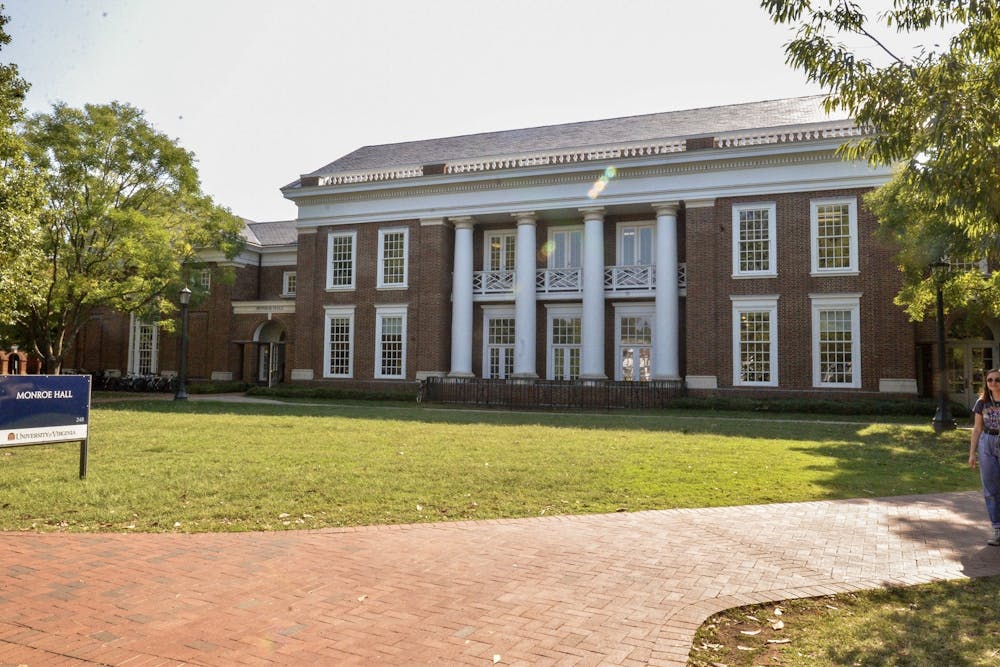The University’s Echols Scholar Program welcomed Assoc. Religious Studies Prof. Karl Shuve as the newest director this year. Shuve’s term follows Astronomy Prof. Kelsey Johnson, who served as director of the Echols program from 2017 to 2022.
The Echols Program is designed to provide academically gifted students with opportunities for enrichment and scholarship. It was founded at the University in 1960 and first-year applicants are automatically reviewed for admission during the undergraduate admissions process. Each Echols class contains approximately 200 students. Students who were not selected as Echols scholars as incoming first years can apply to the program as rising second years.
The role of director includes managing the budget of the program, networking with alumni and delegating responsibilities to other members of the Echols administration. Outside of administrative tasks, Shuve is looking forward to working closely with students and supporting them through their college journey outside of the classroom.
“I'm glad not simply to be able to have the opportunity to teach students in classes, but to help support a large group of students as they go through their time here at U.Va. as they try to pick not only classes but also majors, figure out how [they] can make the most of these four years,” Shuve said.
In his new position, Shuve has already worked extensively on welcoming activities geared towards incoming first-year students in the Echols program. These events — including Zoom advising hours and an enrollment info session — are designed to provide incoming students with support and advice as they enter the University.
Shuve also expressed the importance of cultivating intellectual curiosity and interaction between students through programs like reading clubs and discussion groups where first-year students — led by older Echols Scholars — can discuss the book selected for common reading.
Echols administration works with faculty across departments to put on presentations for Echols scholars including an event with English Prof. Lisa Woolfork.
Shuve also expressed the importance of maintaining connections with Echols alumni to keep them involved in the program even after they graduate from the University. The Echols director and administration want alumni to be able to attend Echols receptions and speak with undergraduate Echols scholars, as well as faculty.
“We want to make sure that [alumni are] aware of what's going on in the program, that they feel welcome to come out to the reception, so whenever they're invited to alumni weekend, we want to make sure that they feel that they can come and meet with me,” Shuve said.
In his 11 years working for the University, Shuve has had a lot of experience working with students, alumni, and faculty. For the last four years, Shuve has taught a COLA class – a one-credit graded seminar available to first-year students – on the NBC sitcom “The Good Place” to teach students about topics in philosophy and religious studies in a fun and engaging way.
Shuve believes that the skills he learned as an instructor and as the previous undergraduate head of the Religious Studies program will be helpful in his new position.
“Both through COLA and through my role as the undergraduate director, I got to know the advising system really well,” Shove said. “I have a pretty good sense of various things that come up in the course of the undergraduate experience.”
As director, Shove said he hopes to continue the legacy of Johnson by working to ensure that students build a strong sense of community with fellow Echols scholars as well as faculty and alumni.
While giving students agency in determining their own course schedule and intellectual pursuits is a key part of the Echols program, Shuve wants to prioritize student and alumni community and engagement with the program.
Echols scholars are exempt from the General Education requirements within the College. This academic flexibility allows these students to pursue their curiosities without restriction. In addition to the flexibility in course selection, Echols scholars can create their own major through the Echols Interdisciplinary Major program.
Over the course of his tenure, Shuve hopes that he will be able to help students through the tumultuous time of coming into college and finding the path and courses that fit them. Beyond that, Shuve wants Echols scholars to see the program as something that they belong to and can shape to fit their needs and goals.
“I want to make sure that students feel that they're empowered [and] that if there are events that they want to do, or if there are aspects that they want to prioritize that they can through counsel or independently of counsel come to me and we can work together and find ways to make that happen,” Shuve said.
Supporting students through their college experience, and their journey within the Echols program is a big part of the job of director. For Shuve, it is important to ensure that the Echols program functions to support the intellectual and social development of students.
“Having a chance to work in a director position that's really engaging a lot with undergraduates that we have at U.Va. has just been a really meaningful experience,” Shuve said. “I want to make sure that the Echols program is providing the kind of student experience for those in the program that is best serving [to] them.”
CORRECTION: A previous version of this article misstated Prof. Kelsey Johnson's title and an event that had occurred in the Echols program. The article has been updated to reflect these corrections.





